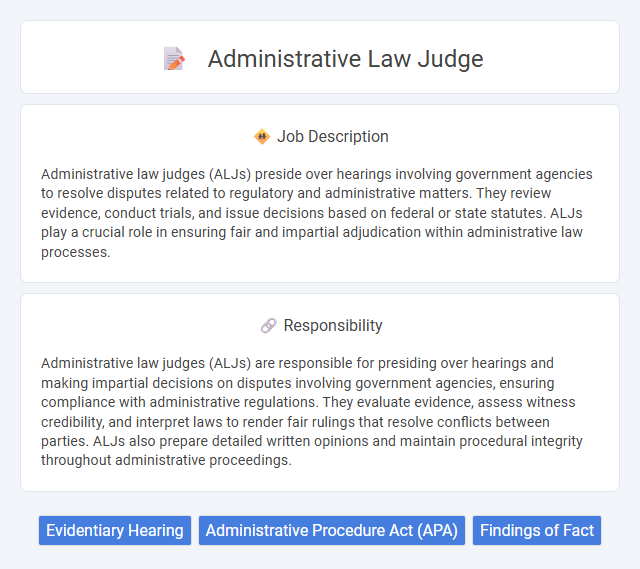
Administrative law judges (ALJs) preside over hearings involving government agencies to resolve disputes related to regulatory and administrative matters. They review evidence, conduct trials, and issue decisions based on federal or state statutes. ALJs play a crucial role in ensuring fair and impartial adjudication within administrative law processes.
Individuals with strong analytical skills and patience are likely well-suited for the role of an Administrative Law Judge, as the job requires carefully reviewing case details and making fair decisions. People who thrive in structured environments and possess effective communication skills may have a higher probability of success in this position. Those who find it challenging to remain impartial or manage high-stress situations might be less compatible with the responsibilities of an Administrative Law Judge.
Qualification
An Administrative Law Judge (ALJ) must possess a Juris Doctor (JD) degree from an accredited law school and be licensed to practice law. Extensive experience in legal proceedings, particularly in administrative or regulatory law, is essential, often requiring several years of relevant practice or judicial experience. Strong analytical skills, impartiality, and a thorough understanding of administrative rules and procedures are critical to effectively adjudicate disputes and ensure fair hearings.
Responsibility
Administrative law judges (ALJs) are responsible for presiding over hearings and making impartial decisions on disputes involving government agencies, ensuring compliance with administrative regulations. They evaluate evidence, assess witness credibility, and interpret laws to render fair rulings that resolve conflicts between parties. ALJs also prepare detailed written opinions and maintain procedural integrity throughout administrative proceedings.
Benefit
An Administrative Law Judge (ALJ) position likely offers substantial job security and a steady income due to its government affiliation. The role typically provides access to comprehensive benefits, including health insurance, retirement plans, and paid leave. Opportunities for professional growth and the ability to impact public policy could also be probable advantages.
Challenge
The role of an Administrative Law Judge (ALJ) likely involves navigating complex regulatory frameworks and interpreting ambiguous laws, which can present significant intellectual challenges. ALJs probably face high-pressure situations requiring impartial decision-making on contentious disputes, demanding strong analytical skills and resilience. Balancing fairness while managing caseloads efficiently may also pose ongoing difficulties in this profession.
Career Advancement
Administrative law judges (ALJs) often experience career advancement by gaining expertise in specialized areas such as social security, labor, or environmental law, enhancing their qualifications for higher-level judicial appointments. Continued education, successful case rulings, and strong analytical skills contribute to promotion opportunities within federal or state agencies. Networking with legal professionals and participating in professional organizations also support career growth and recognition in this field.
Key Terms
Evidentiary Hearing
Administrative law judges conduct evidentiary hearings to evaluate evidence, assess witness credibility, and ensure procedural fairness in disputes involving government agencies. They review documentary evidence and hear testimony to make informed decisions on regulatory compliance, benefits claims, or licensing issues. Mastery of rules of evidence and thorough understanding of administrative procedures are crucial to uphold impartiality and legal standards during these hearings.
Administrative Procedure Act (APA)
Administrative law judges (ALJs) play a crucial role in the enforcement of the Administrative Procedure Act (APA) by conducting hearings and issuing rulings on disputes involving federal agencies. They ensure due process by interpreting regulations, evaluating evidence, and making decisions that comply with the APA's provisions for fair and impartial adjudication. ALJs' adherence to the APA safeguards transparency and accountability in administrative decision-making.
Findings of Fact
Administrative law judges (ALJs) play a critical role in issuing Findings of Fact, which form the factual foundation of their decisions in hearings involving regulatory, employment, and social security disputes. These findings rely on careful evaluation of evidence, witness testimonies, and documentary records to establish the verified facts that determine case outcomes. The accuracy and thoroughness of Findings of Fact by an ALJ directly influence the legitimacy and fairness of administrative rulings.
 kuljobs.com
kuljobs.com